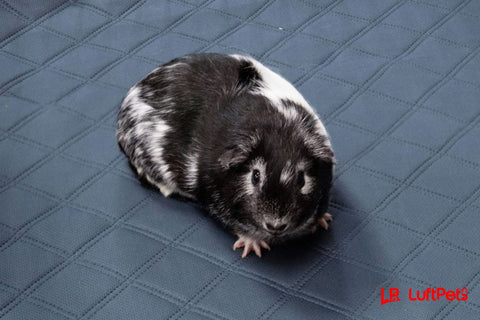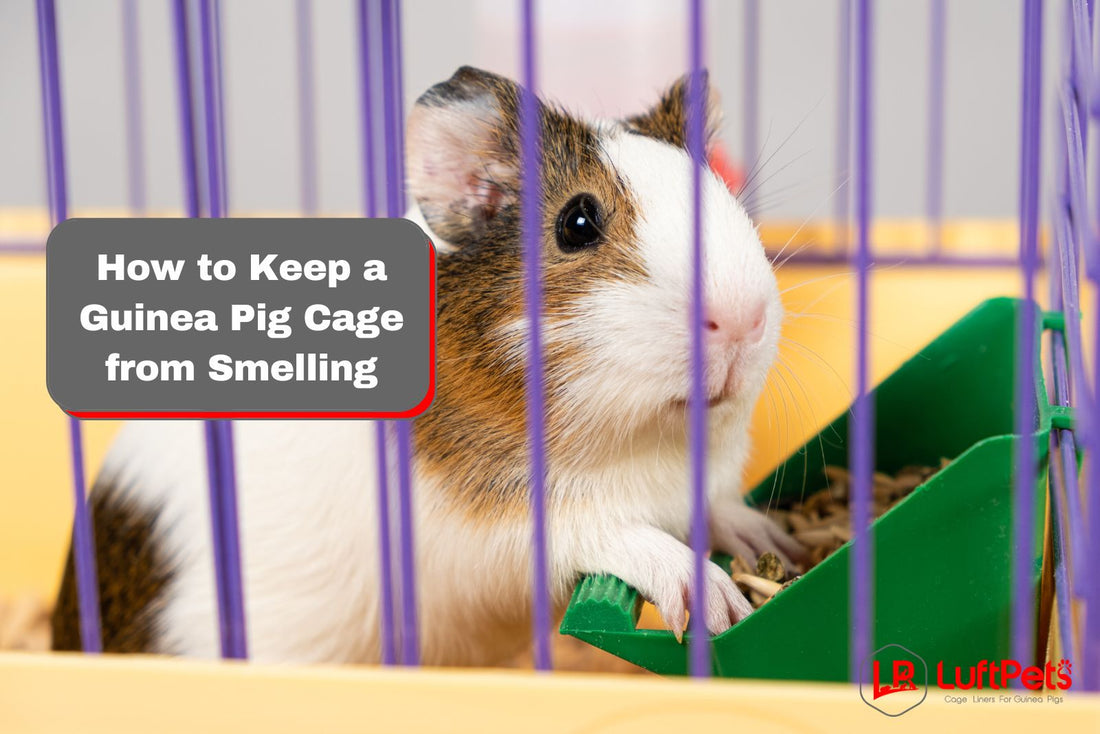Are you wondering how to keep a guinea pig cage from smelling?
When I was a novice guinea pig owner, I never imagined how bad my pet's enclosure could smell after a couple of days.
Fortunately, through trial and error, I learned how to keep the cage as smell-free as possible, and I'm here to share the secret with you.
Just keep reading.
Key Takeaways
- Guinea pigs don't smell bad, so a stinky cage indicates a lack of hygiene, a wrong diet, or a medical problem.
- Daily debris removal is essential for keeping bad odors at bay and preventing health issues in guinea pigs.
- Always consult a vet if your guinea pig or its cage smells strongly despite daily cleaning and regular bedding change.
- To stay on top of your pet's health and habitat cleanliness, maintaining a "guinea pig checklist" can be incredibly helpful. This checklist should include daily, weekly, and monthly care tasks, ensuring a clean environment and the well-being of your guinea pig.
Is It Normal For Guinea Pigs to Smell?
If you've never had a cavy, it's natural to wonder how much they smell. So, before sharing my tips for preventing bad odors in the cage, let's talk about guinea pigs and unpleasant odors.

Many guinea pig owners would tell you cavies don't smell. However, all animals and humans have a specific odor. But your nose gets used to the smell, so you don't notice it.
Moreover, it's healthy for guinea pigs to eat their poop, which often gets tangled in their fur. And male cavies tend to have a stronger smell than female guinea pigs due to their scent glands.
So, don't expect your guinea pigs to smell like fresh roses. But guinea pigs spend a lot of time grooming themselves, so they don't smell bad when you take good care of them.
One way to help manage the smell is by using a Midwest guinea pig cage liner, which can absorb moisture and odors, making the cleaning process easier.
Whenever you notice eye-watering smells wafting from your pet, it's a sign that you're not cleaning the enclosure well or not feeding your cavy the proper diet.
And now, let's talk about what you can do to prevent the guinea pig cage from stinking up the whole house.
How to Keep a Guinea Pig's Cage Smell-Free - 15 Tips and Tricks
So, how do you keep a guinea pig cage from smelling? Maintaining good hygiene and regular bedding change is a good start. But I've got more tips for you.
#1 Switch to a New Bedding
The type of bedding you use has a huge impact on how your cavy's enclosure smells. If the bedding doesn't absorb urine well, the cage starts to stink of ammonia in a few days.
Many guinea pig owners use hay since cavies love eating, playing, and sleeping in it. However, hay gets wet and stinky pretty quickly.
I recommend paper, fleece, or aspen bedding. They're the safe bedding for guinea pigs, absorb urine well, and control unpleasant odors.
Cedar and pine shavings also have a natural scent that removes smells. But they are toxic to guinea pigs if not kiln-dried to remove phenols. Use with caution!
#2 Change the Bedding More Often
When I got my first guinea pig, I thought the bedding would last a couple of weeks before I had to change it. I quickly realized my mistake when the entire cage started to stink.
Depending on your bedding, you must replace it every few days. If the cage still has a strong odor, I recommend putting fresh bedding in the area the guinea pig pees every day.
It's also dangerous to let your piggy live in a dirty environment. Wet bedding promotes bacteria and mold growth, increasing the infection risk.
#3 Daily Spot Cleaning
The most important thing for preventing cage odor is daily spot cleaning. You must remove poop, food leftovers, and other debris several times daily.
Also, keep track of the area your guinea pig uses as a toilet. Refresh the dirty bedding daily and change it completely every 3-4 days.
#4 Deep Cleaning the Entire Cage
As specialists from VCA Animal Hospital say, "Guinea pigs can quickly make a mess of a cage, so cages need to be spot-checked daily and thoroughly cleaned at least once weekly." (1)
But many guinea pig owners forget an essential detail about deep cleaning - you must wash everything to eliminate the foul odor, not just the cage.
Here's how to do a deep cleaning:
- Remove your guinea pig from the smelly cage and put it in a safe location.
- Get your cavy's toys, water/food dish, and accessories out of the cage and wash them with warm water.
- Remove the wet bedding. If you use disposable wood or paper bedding, scrape it from the bottom.
- Wash any reusable bedding in hot water to get rid of foul odors. Add a bit of white vinegar for stubborn smells but avoid baking soda because it can irritate your cavy's lungs.
- Clean the cage with hot water and scrub it well with a brush. For strong unpleasant smells, use a cage cleaner or an odor eliminator. Just ensure it's safe for cavies.
- Alternatively, mix white vinegar with water. It's a great homemade solution for neutralizing odors and preventing bacteria and mold growth.
- Rinse the cage well to remove any residue and leave it to dry. Once dry, put everything back inside.
#5 Consider Cage Liners
You can keep your your guinea pig's cage clean with cage liners. They're a great alternative to disposable bedding, such as paper or wood shavings, because they're dust free and easy to maintain.
Moreover, some cage liners have a waterproof layer, unlike fleece bedding. So, they're better at preventing urine from leaking to the bottom of the cage and controlling bad smells.
I recommend Luftpets' small pet cage liners because they're waterproof, washable, and absorbent.

#6 Bathe Your Piggy
Long-haired guinea pigs sometimes struggle to maintain good hygiene, so they can become stinky. But can you bathe your cavy? The answer is yes!
However, you shouldn't bathe your guinea pig more than a couple of times yearly because it strips away the natural protective oils from the fur, leading to dry skin.
Here's a quick guide to bathing:
- Prepare a sink or a wash basin with a flat surface, guinea pig-friendly shampoo, and towels.
- Place a non-slid mat on the bottom of the sink, or your guinea pig might escape.
- Fill the sink with lukewarm water (from 90°F and 95°F ) and place the cavy inside.
- Gently shampoo your pet and clean their fur.
- While bathing your cavy, be careful not to let them inhale or swallow the bath water.
- Rinse the shampoo and dry your guinea pig as quickly as possible. Cavies are prone to chills and can get sick if they remain wet.
And if your guinea pig doesn't maintain hygiene or gets greasy in a few days, you should talk to a vet to rule out a medical problem.
#7 Give Your Cavy a Trim
Long-haired cavies often have poop and food leftovers stuck in their fur, which they can't remove. So, to keep the cage clean, you should trim your cavy's fur at least once a month.
Pay special attention to the area around the tail and bottom because it's easy for feces to get tangled in the long fur. Watch this video to see how to do it without hurting your piggy.
Regularly grooming the fur with a soft-bristle brush is also an excellent way to prevent debris and poop from stinking up the cage and your pet.
#8 Change the Diet
Certain food can make your guinea pig gassy, which explains why the cage smells bad despite regular cleaning.
According to RSPCA, hay and grass should make up most of your piggy's diet. But you should also provide pellets, fresh veggies, and fruits because they're rich in nutrients and vitamins. (2)
Avoid gassy foods like cauliflower, cabbage, kale, broccoli, and Brussels sprouts. Also, don't feed your pet cooked food, dairy products, avocado, and meat.
#9 Litter Box Training
Training your cavy to use a litter box is an excellent way to make spot cleaning easy and reduce foul smells. And it's not as hard as you imagine:
- Place a litter tray with a few inches of bedding material in the area your guinea pig uses as a bathroom. I recommend paper or newspapers.
- Observe your cavy and move the litter box if your guinea pig uses another spot to pee/poop.
- Don't use cat litter. It's unsafe for cavies and can cause many health problems, such as intestinal obstruction, respiratory issues, and allergies.
- Watch this video to see how to litter train your guinea pig.
#10 Rule Out a Medical Problem
If you clean the cage regularly but can't get rid of bad smells, you should take your piggy to the vet to rule out health issues.
When cavies have urinary tract infections, their pee has a strong, unpleasant odor. Diarrhea, dental problems, respiratory diseases, and abscesses can also contribute to bad cage odors.
You should watch for warning symptoms such as loss of appetite, lack of grooming, lethargy, eye/nose discharge, and sudden behavior change.
But it's a good idea to mention the smell problem to your vet, even if your cavy has no other symptoms.
#11 Neuter Your Cavy
As I mentioned in the beginning, some male piggies smell more than females. That's because they have an active scent gland (it's in the tail area), which secrets an oily substance to mark territory.

Neutering your cavy can reduce the greasy build-up around the gland area and prevent bad smells from accumulating around the cage.
However, keep in mind that neutering won't change your piggy behavior or stop them from fighting other males. And neutering small animals is more dangerous than larger pets, such as cats and dogs.
So, if you're worried about smells, I recommend getting female guinea pigs. They tend to be calmer and less likely to fight.
#12 Buy a Larger Cage
Sometimes the odor problem is related to the cage's size. Many commercial guinea pig cages are too small, especially for multiple guinea pigs.
Your cavies have little room to do their business in a tiny cage, so the bedding gets wet quickly and can't dry. A bigger cage can help with the smell and improve your guinea pig's health.
The Human Society of the United States recommends at least 7.5 square feet (30" x 36")for a single guinea pig and 10.5 square feet (30" x 50") for two. (3)
#13 Provide Adequate Ventilation
If you have a stinky guinea pig cage, consider whether it has proper ventilation. For example, enclosures with solid sides should have a wire top mesh to provide enough air.
Ensure you use a cage designed for guinea pigs because other types of enclosures can be too hot for your cavy to handle.
#14 Use an Air Purifier
Whenever my cavy is sick and stinkier than usual, I use an air purifier with activated carbon to remove urine/feces odors. It's not a miracle solution, but it eliminates the worst smells.
Moreover, an air purifier benefits cavies with sensitive respiratory systems, prone to allergies or asthma attacks.
However, never use an air freshener, oil diffuser, or other fragrances in your guinea pig cage. Some oils are toxic to small animals, and the strong scents can irritate your pet's lungs.
#15 Get a New Cage
Think about how long you have been using your current guinea pig cage. Most guinea pig enclosures are made of plastic, which can accumulate unpleasant smells over time.
So, if you can't get the foul odors out of the cage with vinegar and enzyme cleaners, it may be time to buy a new one.
FAQs
1. Why does my guinea pig cage smell so fast?
Guinea pig cages smell bad when you don't remove feces, food leftovers, and soiled bedding daily. Some medical issues can also cause bad cage odors.
2. Do guinea pigs smell up the room badly?
Guinea pigs shouldn't smell bad or stink up the room. If your cavy is smelly, the cause can be a dirty cage, underlying disease, or wrong diet.
3. Can I use an air freshener with guinea pigs?
Don't place air fresheners or other fragrances in your guinea pig habitat. Cavies have sensitive respiratory systems, so strong odors can irritate their lungs.
Conclusion
Keeping a guinea pig cage odor-free is all about maintaining hygiene by changing the wet bedding often, picking poop several times per day, and washing everything.
And don't forget that guinea pigs need proper grooming and an occasional bath to prevent bad smells from accumulating in the cage.
So, while guinea pigs are small and cute, it can be overwhelming to keep their cage spot-clean. Think about that if you're thinking about whether a guinea pig is the right choice for you.
What do you think about these 15 tips on how to keep a guinea pig cage from smelling? Do you have any other tricks? Share your thoughts in the comment section.
Resources:
1. https://vcahospitals.com/know-your-pet/guinea-pigs-owning
2. https://www.rspca.org.uk/adviceandwelfare/pets/rodents/guineapigs/diet

